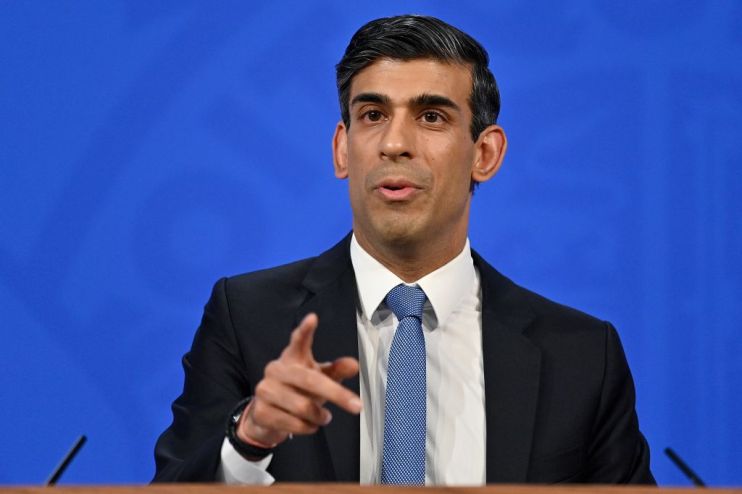Balancing the budget won’t win voters hooked on Sunak’s years of spending

On a balmy September day eight years ago, Ed Miliband strode onto the stage at Labour Party Conference and proceeded to deliver a marathon 66-minute speech without notes.
Unfortunately for the then Labour leader, he managed to forget a key chunk of his prepared remarks – the bit about tackling the deficit.
Cue glee from the Tory press and widespread criticism from his own side including trade union baron Len McCluskey, who said forgetting the deficit was a “glaring omission”.
The context here is critical. Labour was preparing for a General Election and struggling to regain any kind of economic credibility in the wake of the credit crisis and Liam Byrne’s infamous “There’s no money left!” greeting to the incoming Tory Treasury team in 2010.
It makes recent events all the more astounding. Just last week a poll by Redfield and Wilton suggested the public now trusts Labour more than the Conservatives on the economy. It gave Sir Keir Starmer’s Labour a three-point lead – 32 per cent to 29 per cent.
Political fortunes can change on a dime – a lesson Chancellor Rishi Sunak has learnt the hard way – but Labour winning the trust battle on the economy? That is an fundamental shift.
Just two years ago, as the first Covid-19 lockdown rules began to ease, a similar poll by YouGov gave the Conservatives a 20-point lead over Labour – 41 per cent to 21 per cent. Yesterday, the same poll put the two parties neck-and-neck. It’s staggering what a cost-of-living crisis will do.
But the remarkable turnaround reflects a shift in the electorates across older democracies in the West. We’ve become addicted to giveaways and spending pledges. It’s almost impossible for a political party to campaign on the basis of book balancing and fiscal prudence.
In Britain, it began when Jeremy Corbyn first popped up on our TV screens in the Labour leadership contest in 2015.
All three of his rivals promised to tackle the deficit and show fiscal responsibility. Andy Burnham, with his love of a leadership bid, stole headlines in the Guardian for admitting Gordon Brown’s Labour had overspent.
Not Jeremy. He went into the 2017 General Election pilloried by the likes of the Daily Mail for threatening to spend £90bn.
Now this looks like small change in comparison to the cost of battling the pandemic. When Rishi Sunak unleashed a £400bn rescue package, his ratings soared through the roof.
He was at it again in November, promising £150bn more in public spending. It was the sort of commitment that would have had Mr Corbyn dancing in the Islington streets.
Voters’ reaction to the widely derided Spring Statement – and the apparent change in course by the Chancellor – highlights just how much expectations have changed.
Rishi Sunak’s allies argue – with some justification – that the Chancellor made big moves such as cutting fuel duty by 5p per litre and softening the blow of the NI tax hike for the poorest.
But the general consensus is that putting away his ‘Big Bazooka’ and leaving the nation with a mammoth tax burden was disastrous.
Team Rishi insist the Conservatives have to have a different offer to Labour at the next General Election and should go back to being fiscally responsible. If the Tories just match Labour in writing blank cheques, people may just opt for Labour as it’s something different after a decade of Tory rule.
They may have a point. But not yet – not with inflation heading towards 9 per cent and the only apparent Brexit dividend is the record breaking queues on the M20.
Like it or not, post-pandemic, intervention is set in the national psyche.
The Chancellor would be well advised to start putting together a new package of targeted, strategic investments in areas the public “get” that help relieve the strain on households, seek to increase the long-term wealth of the nation, and appease his own party.
Fortunately he has the chance to do so before the Autumn Budget, given Ofgem is due to announce the next increase in the Energy Price Cap this august.
Why not for instance, back a revolution in the manufacturing of technology for early cancer diagnosis. Why not finally agree to a tub-thumping nationwide retrofitting energy efficiency plan for the nation’s oldest homes. It could be part-funded by bonds both the public and institutions could invest in.
A month ago, Rishi Sunak said he was a “show, don’t tell” person. He added: “Judge me by my actions.” That was before the Spring Statement. He now needs to show he has a political antenna.